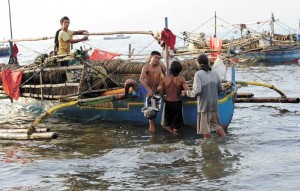THE massive oil spill in Manila Bay on Friday has been “mostly contained” as government personnel and private individuals worked the whole day yesterday to control the slick that also shut down the fishing industry in Cavite.
Ryan Santos, a district official at one of the hard-hit coastal villages, said the fuel polluting the water had dissipated noticeably a day after it was released, but its pungent stench remained.
“A few local fishermen are putting to sea again, but have to go much further out to reach the fish,” Santos told Agence France-Presse by telephone.
However, most stayed at home.
“They are complaining that the slick is fouling up their boat hulls and nets,” he added.
Local officials said fish and other marine life floated up dead and some residents fell sick from the fumes after an estimated 500,000 liters of the fuel cast a slick across 20-kilometers of coastline near the capital Manila from Thursday.
The Coast Guard said the slick, which by Friday covered a 300-square-kilometer area, was likely released by either a fuel depot in the area or an oil tanker that had unloaded its cargo at the terminal.
Manila Bay is the country’s most important waterway in a region where about 30 million people, nearly a third of the Philippines’ population, live.
Petron Corp, the depot owner, struck a deal with the government earlier Saturday for both sides to deploy more oil containment booms and crews to speed up the clean-up, Coast Guard spokesman Commander Armand Balilo said.
“It has been mostly contained. Our latest feedback is that some of the slick is evaporating the natural way under the heat of the sun,” he said.
“Nevertheless, exposure to diesel is harmful to human health and to marine life, so we are exerting efforts to collect what is left out there,” he told reporters.
Jose Ricafrente, mayor of Rosario town in Cavite where the depot is located, vowed to file a class suit against Petron once authorities determine that it is responsible for the oil spill. He said the spill jeopardized the livelihood of 40,000 people who depend on the town’s vital fishing industry.
“I will file criminal charges of negligence and civil action with damages against the culprit” the mayor said.
The huge spill also affected the towns of Tanza, Naic and Ternate in Cavite.
Herma Shipping and Transport Corporation (HSTC) however said its tanker, MT Makisig, was not responsible for the spill.
In a statement, Enrico Cavestany, HSTC president, maintained that Makisig “completed, without any incident, discharging operations of petroleum product last August 8 following safe, secure and standard operating procedures through Petron’s underwater pipeline at the Rosario, Cavite depot.”
Santos, the village official in Rosario, said about a hundred fishers who were temporarily put out of work was helping gather the spilt fuel from the water on Saturday.
The fuel is put into water bottles, which they handed over to village officials in exchange for claim stubs that entitled them to emergency food rations from the social welfare ministry.
Rosario municipal officer Noriel Emelo said 11 barangays were affected by the slick.
Some people who fell sick after inhaling the fumes remain in hospital and are being treated for headaches, dizziness, shortness of breath and palpitation.
Rosario is a major supplier of smoked fish or ‘tinapa’.
AFP and Rogelio Limpin


